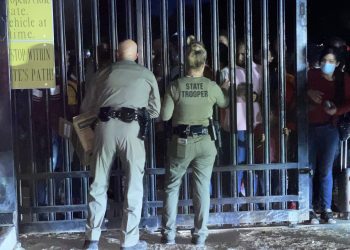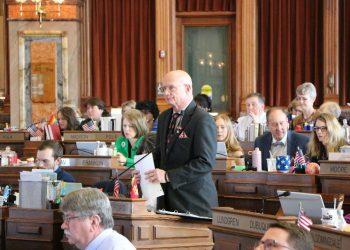DES MOINES, Iowa – Gov. Kim Reynolds said that she plans to take the COVID-19 vaccine but will wait for the vaccine to become more readily available.
She also relaxed some of her mitigation standards at the end of her remarks, including the restrictions on gatherings, heading into Christmas and New Year’s Day.
“I want Iowans to know that I plan to be vaccinated after healthcare workers and long term care residents and staff have received their vaccination. Exactly when that will occur will depend on prioritization for the next phase of the vaccination,” Reynolds said.
She noted that her decision to wait is not because of any hesitancy about the vaccine. She said she wants to make sure those who need it the most get it first.
“During this first phase, I want to make sure that those on the front lines caring for Iowans and long-term care residents who are at risk are vaccinated. First, I’m confident that the vaccine is both safe and effective. And I look forward to being vaccinated as soon as the supply increases and access expands to the broader population. And I’ll let you know exactly when that will be. In the meantime, I’ll continue to follow public health guidance as we all must to protect ourselves and others from the virus while it still remains active in our communities,” Reynolds added.
The FDA provided emergency approval for the Pfizer COVID-19 vaccine and approval for the Moderna vaccine in days. Reynolds announced that over 500 health care workers in Iowa were already vaccinated with vaccine shipments arrived first at the University of Iowa Medical Center in Iowa City and UnityPoint Iowa Methodist Medical Center in Des Moines. Mercy One and Genesis facilities have also received the vaccine.
Reynolds included Dr. Clint Hawthorne, an emergency medicine physician, and director of the emergency departments at UnityPoint Medical Centers in the Des Moines Metro, who received the vaccine on Tuesday.
He said he had not felt any adverse effects.
“It is a day we have been looking forward to for months, I’ve been asked by many how I feel about being vaccinated. And the answer is simple, grateful. Grateful to be amongst the first vaccinated, grateful to the community of scientists who diligently and with great attention to safety developed an amazingly effective vaccine. Grateful to have hope this will be the beginning of the end of the pandemic and, Lord willing, and eventual return to normal,” Hawthorne said.
He said questions about the vaccine is healthy.
“Good questions are part of why modern medicine has advanced where it is. You have much in common with the scientists who developed the vaccine, who by their nature are also astute question asker. My request is you ask your healthcare provider for reliable sources of information so that you can learn more. Although this is an exciting time, and we can see much promise, we should not let our guard down,” Hawthorne added.
He encouraged Iowans to be vaccinated when the vaccine is available.
“The more who are vaccinated, the more effective we will be at slowing the spread is a safe and effective way you can be a part of bringing COVID-19 under control,” Hawthorne concluded.
Reynolds seconded his encouragement for Iowans not to let their guard down.
“For months, we’ve been anxiously awaiting a vaccine knowing that it would mark the most significant turning point in this pandemic. It’s finally here and with it comes the hope that life will truly return to normal in the not too distant future. But for now, we must continue to be patient for a few more months as the vaccine supply increases along with the number of people who will be receiving it,” she said.
Reynolds announced that the Iowa Department of Public Health would provide updates about the vaccines on their website and include data on the number of Iowans vaccinated on the state’s COVID-19 dashboard.
She warned that achieving widespread vaccinations will take some time.
Kelly Garcia, interim director of the Iowa Department of Public Health, said the current priorities are health care workers and residents and staff in long-term care facilities.
She said Iowa’s Infectious Disease Advisory Council (IDAC) would meet to discuss who should receive it next.
“When IDOC meets next week, they will begin to focus their discussion on prioritization for phase one be critical infrastructure, which includes those who work in other congregate settings, like schools, food supply, corrections,” Garcia said.
She noted these are difficult decisions, and the priority will be on work settings.
Reynolds, toward the end of her remarks, noted that Iowa continues its downward positivity trend with the average 14-day positivity rate at 13.8 percent and the 7-day positivity rate down to 10.4 percent. She added only one county still has a 20 percent positivity rate, 12 counties are between 15 and 20 percent, 44 counties are between 10 and 15 percent, and 42 counties have a less than ten percent positivity rate.
She stated that hospitalizations continue to decline and are half of what the state experienced when hospitalizations peaked at 1500 in mid-November.
“We’ve made tremendous progress over the last several weeks in large part due to Iowans adjusting their behavior, and we’re seeing the positive impact that it’s had. This doesn’t mean that our work is done. But it’s proof that we have the tools necessary to effectively manage the virus while balancing the activities of our daily lives,” she said.
Reynolds said she would relax restrictions for restaurants and bars, allowing them to resume regular business hours instead of closing at 10:00 pm, but social distancing requirements are still in place. The number of spectators at sporting events are expanded to include members of a participant’s household. Reynolds lifted the restrictions on gatherings. Her previous proclamation limited indoor social, community, business, or leisure gatherings or events to no more than 15 people, and outdoor gatherings were limited to no more than 30 people. Masks are not required at those activities, but social distancing and other public health precautions are required.
Those changes go into effect at 12:01 am on Thursday, December 17, and stay in effect until January 8, 2021.
“This holiday season. I encourage you to celebrate but celebrate responsibly. We saw the benefit that adjusting our traditions over Thanksgiving had. I’ve heard from many friends and fellow Iowans who found smaller gatherings maybe even a little more enjoyable and much less stressful. Continue to be mindful. You know, it’s easy for us to let our guard down when we’re gathering with family members and friends. And that’s exactly why these types of gatherings tend to be where we see the virus spread. So we’ve seen the positive effects that gathering in small groups can have. So please keep that in mind throughout the holiday season. It won’t be long now before the vaccine becomes more widely available, and life truly is back to normal, and it will be worth the wait,” Reynolds said.
The mask mandate is left in place.
U.S. Rep. Cindy Axne, D-Iowa, criticized Reynolds’ decision to lift gathering restrictions.
“While this week brought us light at the end of the tunnel of this pandemic with the distribution of our first COVID-19 vaccine, we have a long way to go before we can return to life as normal,” she said in a released statement.
“Relaxing statewide restrictions on social gatherings sends the wrong message to Iowans that the December holiday season presents less risk than Thanksgiving did. While a decline in record infection rates is certainly a positive sign, we all must recognize that our shared sacrifice of large in-person gatherings this holiday will slow the spread of this disease and give Iowans the chance to enjoy holidays together in the future,” Axne added.
Listen to the full press conference:
Read the updated proclamation below:
Public Health Proclamation - 2020.12.16














